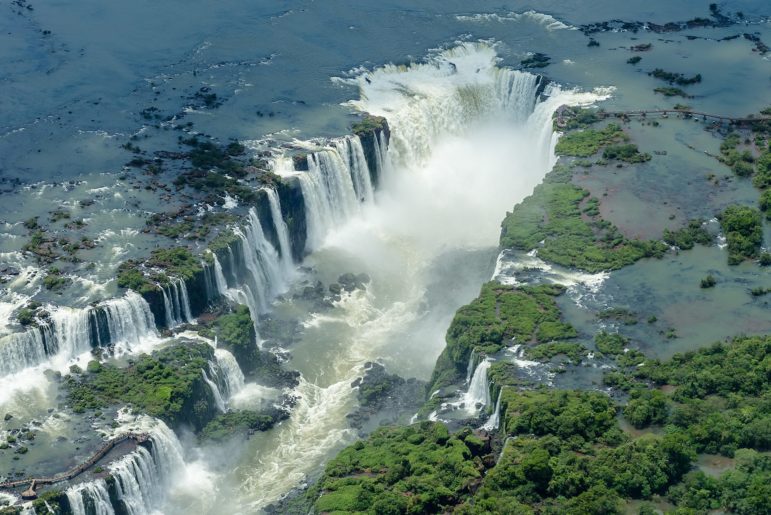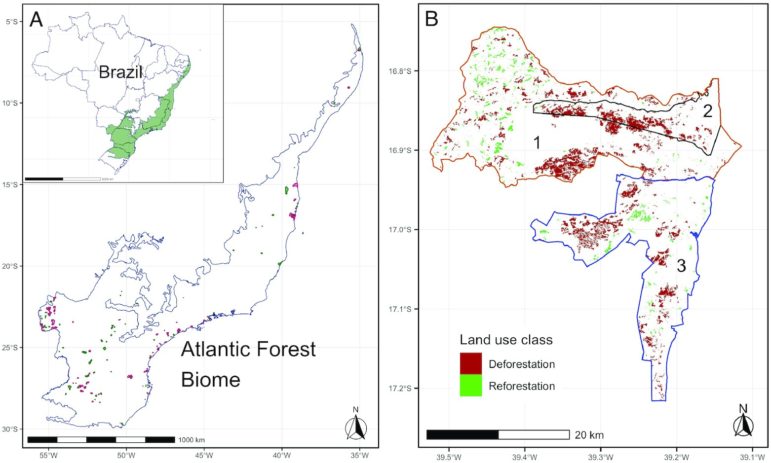TWH – A new study suggests that the ideal way to preserve forests in Brazil is to secure the legal recognition of Indigenous lands. The study suggests that legal recognition will reduce deforestation and increase reforestation in Indigenous territory.
The researchers note, “Indigenous peoples, Afro-descendant populations, and local communities have claims to over half the planet’s land, yet only 10% of the planet is legally recognized with communal land ownership rights.”
However, the researchers said, political systems worldwide undermine Indigenous claims to ancestral lands. They noted that encroachment through squatters and land-grabbers, as well as industries that extract resources from the land such as mining and logging, present a constant threat to Indigenous lands.

Iguazu Falls on the Argentina–Brazil border [Photo Credit: Enaldo Valadares – CC BY-SA 3.0]
The recent policies of former Brazilian president Jair Bolsonaro have led to an acceleration of deforestation and losses of Indigenous rights. Bolsonaro specifically promised to resist land demarcation that would secure Indigenous territory, and also removed environmental protections while encouraging the development of the land by agribusiness.
During a single year of the Bolsonaro presidency, deforestation of the Atlantic Forests increased by 30 percent.
Murders also happen. One report by Global Witness last year found that every other day, a land defender is killed and most of them are Indigenous or Afro-descendant.
“All over the world, Indigenous peoples, environmental activists, and other land and environmental defenders risk their lives for the fight against climate change and biodiversity loss,” reads the report. “They play a crucial role as a first line of defense against ecological collapse, yet are under attack themselves facing violence, criminalization, and harassment perpetuated by repressive governments and companies prioritizing profit over human and environmental harm.”
The SOS Mata Atlântica Foundation, an organization working to restore the forests, agrees and notes that the Brazilian Atlantic Forests have been the target of deforestation at a higher rate that the Amazon. They note that these forests are home to some 20,000 species, 6,000 of which live nowhere else in the world. They also point out that the forests are a critical source of water for the cities and communities that lie alongside them.
Indigenous communities have been seeking demarcation for generations. Only one territory of the Atlantic Forests has been granted demarcation since 2012. While other Indigenous communities have begun the process of legal demarcation, but obtaining official recognition is painstakingly slow.
“Demarcation is important because it is not only a social issue, but also a spiritual, traditional, and cultural issue,” said Jurandir Karai Djekupe, a Guarani Mbya leader from the north of São Paulo. “It’s something that encompasses everything.”
The researchers examined the length of time (tenure) on Indigenous lands. But unlike previous research that examined Indigenous lands that are closer to urban locations and more likely to undergo development pressures, they focused their attention on Brazil’s Atlantic Forests that parallel the Atlantic coast.
The forests extended from Brazil’s extreme northeast southward to Northern Argentina and Paraguay. The region ranges from stable coastal dunes to tropical forests southward to dry forests and higher altitude drier regions. They cover 200 Indigenous territories and, at their height, covered 1 million square kilometers, now less than one-tenth their original size.

Study site. (A) The locations of ILs with formalized tenure (green) and earlier in the tenure process (red) in the AF biome; inset: the location of the AF biome in Brazil. (B) Forest cover change from 1985 to 2019 in three contiguous ILs in the northeast state of Bahia: Barra Velha (2) has tenure (1991), while Barra Velha do Monte Pascoal (1) and Comexatibá (3) do not (as of March 2022). Forest cover change includes combined changes from 1985 to 2019, which for Barra Velha represents both before and after tenure. [Courtesy]
“Our study contributes to an emerging body of evidence suggesting that rights-based policy for Indigenous lands can improve environmental outcomes,” said Marcelo Rauber, a co-author, and researcher at the National Museum of the Federal University of Rio de Janeiro. “Known in Brazil as demarcação, the legal recognition of Indigenous Peoples’ land rights provides Indigenous Peoples with territorial autonomy, which support efforts to address longstanding human rights violations, land grabs, biodiversity loss and climate change.”
The researchers found that formalizing land rights and tenure for Indigenous communities and recognizing their territorial integrity was essential to improve the Atlantic Forest’s conditions. They wrote, “our results suggest considerable potential for reduced deforestation and/or recovery of forests in [Indigenous Lands] in the [Atlantic Forests] if lands that do not have formalized tenure complete the final stage of the tenure process.”
The newly installed president, Luiz Inácio Lula da Silva, says he is working to change the trajectory of deforestation and improve the right of Indigenous communities. He has already begun to reverse many of Bolsonaro’s policies. Indigenous communities believe they will be offered the tools to secure their land rights under Lula da Silva.
Lead author Rayna Ben-Zeev said, “The new administration has an opportunity to turn this trend around by upholding the Brazilian constitution and granting Indigenous peoples with territorial autonomy and self-determination rights.”
“Protecting our territory means protecting our own life because we depend on it,” said Jerá Poty Mirim, a Guarani Mbya leader from the Tenondé Porã territory. “The demarcation guarantees the continuity of those cultures that respect and protect nature.”
The Wild Hunt is not responsible for links to external content.
To join a conversation on this post:
Visit our The Wild Hunt subreddit! Point your favorite browser to https://www.reddit.com/r/The_Wild_Hunt_News/, then click “JOIN”. Make sure to click the bell, too, to be notified of new articles posted to our subreddit.